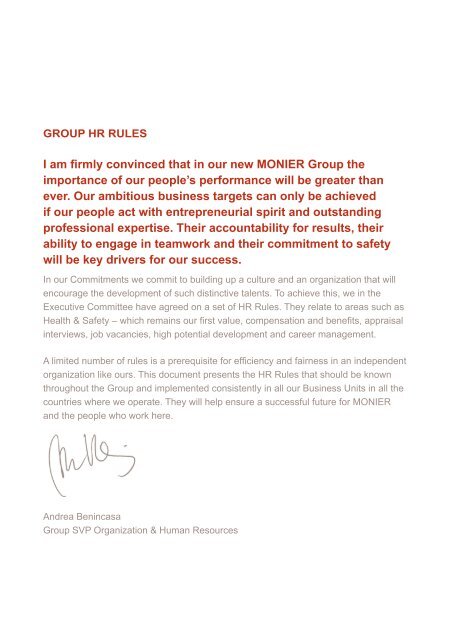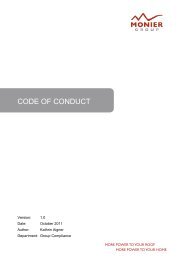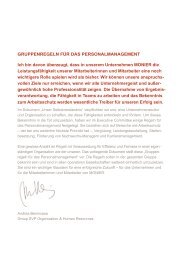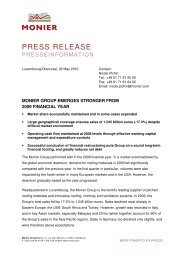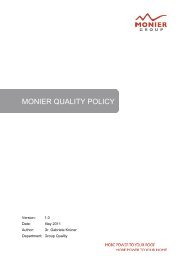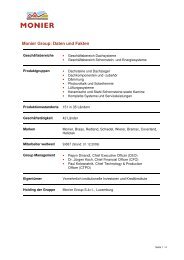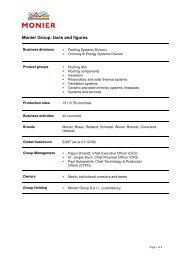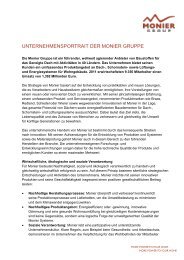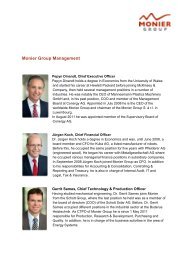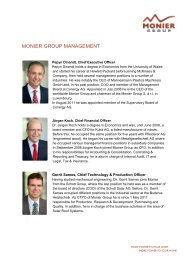I am firmly convinced that in our new MONIER Group the importance ...
I am firmly convinced that in our new MONIER Group the importance ...
I am firmly convinced that in our new MONIER Group the importance ...
You also want an ePaper? Increase the reach of your titles
YUMPU automatically turns print PDFs into web optimized ePapers that Google loves.
GROUP HR RULES<br />
I <strong>am</strong> <strong>firmly</strong> <strong>conv<strong>in</strong>ced</strong> <strong>that</strong> <strong>in</strong> <strong>our</strong> <strong>new</strong> <strong>MONIER</strong> <strong>Group</strong> <strong>the</strong><br />
<strong>importance</strong> of <strong>our</strong> people’s performance will be greater than<br />
ever. Our <strong>am</strong>bitious bus<strong>in</strong>ess targets can only be achieved<br />
if <strong>our</strong> people act with entrepreneurial spirit and outstand<strong>in</strong>g<br />
professional expertise. Their accountability for results, <strong>the</strong>ir<br />
ability to engage <strong>in</strong> te<strong>am</strong>work and <strong>the</strong>ir commitment to safety<br />
will be key drivers for <strong>our</strong> success.<br />
In <strong>our</strong> Commitments we commit to build<strong>in</strong>g up a culture and an organization <strong>that</strong> will<br />
enc<strong>our</strong>age <strong>the</strong> development of such dist<strong>in</strong>ctive talents. To achieve this, we <strong>in</strong> <strong>the</strong><br />
Executive Committee have agreed on a set of HR Rules. They relate to areas such as<br />
Health & Safety – which rema<strong>in</strong>s <strong>our</strong> first value, compensation and benefits, appraisal<br />
<strong>in</strong>terviews, job vacancies, high potential development and career management.<br />
A limited number of rules is a prerequisite for efficiency and fairness <strong>in</strong> an <strong>in</strong>dependent<br />
organization like <strong>our</strong>s. This document presents <strong>the</strong> HR Rules <strong>that</strong> should be known<br />
throughout <strong>the</strong> <strong>Group</strong> and implemented consistently <strong>in</strong> all <strong>our</strong> Bus<strong>in</strong>ess Units <strong>in</strong> all <strong>the</strong><br />
countries where we operate. They will help ensure a successful future for <strong>MONIER</strong><br />
and <strong>the</strong> people who work here.<br />
Andrea Ben<strong>in</strong>casa<br />
<strong>Group</strong> SVP Organization & Human Res<strong>our</strong>ces
2007<br />
Monier <strong>Group</strong> GmbH, Frankfurter Landstrasse 2-4, 61440 Oberursel, Germany<br />
T +49 6171 61 006 F +49 6171 61 2300 September
GROUP HR RULES
A limited number of rules are a prerequisite to efficiency and<br />
fairness. These rules are mandatory and should be known by<br />
everyone <strong>in</strong> <strong>our</strong> organization and implemented consistently<br />
throughout <strong>the</strong> <strong>MONIER</strong> <strong>Group</strong>.<br />
1. Safety<br />
Safety is <strong>our</strong> first value, a matter of ethics and moral responsibility for every s<strong>in</strong>gle employee of<br />
<strong>our</strong> <strong>Group</strong> – it is also a matter of performance s<strong>in</strong>ce <strong>the</strong>re can be no operational performance<br />
without safety <strong>in</strong> <strong>the</strong> workplace.<br />
All managers are responsible for ensur<strong>in</strong>g <strong>that</strong> safety systems, progr<strong>am</strong>s and policies are <strong>in</strong><br />
place and effectively implemented to provide employees, subcontractors and third parties with<br />
a safe work<strong>in</strong>g environment. Bus<strong>in</strong>ess Units must implement <strong>the</strong> <strong>Group</strong>’s Health and Safety<br />
Management System, <strong>in</strong>clud<strong>in</strong>g <strong>the</strong> correspond<strong>in</strong>g report<strong>in</strong>g requirements.<br />
2. Annual Appraisal Interview and Regular Feedback<br />
Delegation, feedback and evaluat<strong>in</strong>g results are part of <strong>the</strong> responsibilities of every manager.<br />
It is important to periodically discuss and agree on an <strong>in</strong>dividual’s commitment and contribution<br />
to <strong>the</strong> performance of <strong>the</strong> company <strong>in</strong> a formalized way.<br />
All managers Hay 13 and above must have an appraisal <strong>in</strong>terview with <strong>the</strong>ir superior (N+1)<br />
at least once a year to evaluate <strong>the</strong>ir performance, identify potential issues, set <strong>the</strong>ir personal<br />
objectives and review <strong>the</strong>ir development plan. Appraisals must respect a common standard:<br />
“SMART” (= Specific, Measurable, Achievable, Realistic, Timely) personal objectives, a<br />
formalized personal development plan, upward feedback and validation by N+2.<br />
The N+1, with <strong>the</strong> support of <strong>the</strong> HR function, is responsible for <strong>the</strong> follow-up of <strong>the</strong> personal<br />
development plan of his/her direct reports.<br />
Fur<strong>the</strong>rmore all managers should regularly conduct feedback sessions with direct reports to<br />
monitor <strong>the</strong>ir performance and review <strong>the</strong>ir development plan throughout <strong>the</strong> year.<br />
3. Appo<strong>in</strong>tment / Term<strong>in</strong>ation / Compensation review<br />
Our local bus<strong>in</strong>esses are usually small and can only provide limited career opportunities. To ensure<br />
<strong>that</strong> we offer <strong>the</strong> best development options to <strong>in</strong>dividuals, we believe <strong>that</strong> career management<br />
should <strong>in</strong>volve people who have sufficient visibility of what <strong>the</strong> organization can offer.<br />
The recommendation for all major decisions regard<strong>in</strong>g people management, <strong>in</strong>clud<strong>in</strong>g position<br />
appo<strong>in</strong>tments, term<strong>in</strong>ations and compensation reviews, is made by <strong>the</strong> N+1 with <strong>the</strong> support<br />
of <strong>the</strong> HR function. The f<strong>in</strong>al decision is made by N+2, who ensures <strong>that</strong> <strong>the</strong> process has been<br />
fair and <strong>that</strong> it respects <strong>the</strong> <strong>in</strong>terest of <strong>the</strong> <strong>Group</strong> and of <strong>the</strong> <strong>in</strong>dividuals concerned.<br />
The relevant functional heads at <strong>Group</strong> level must be <strong>in</strong>formed about vacancies for functional<br />
or technical jobs <strong>in</strong> <strong>the</strong> Bus<strong>in</strong>ess Units, help HR identify possible candidates and make<br />
recommendations to N+1 and N+2.
4. Vacancies<br />
In order to offer employees a greater variety of job opportunities and assure transparency <strong>in</strong><br />
career moves, all positions between Hay 13 and Hay 20 are to be published on <strong>the</strong> <strong>Group</strong>’s<br />
<strong>in</strong>tranet Job Market for <strong>the</strong> country concerned. Bus<strong>in</strong>ess Units may publish all positions Hay 12<br />
and below at <strong>the</strong>ir discretion. <strong>Group</strong> HR has to be timely <strong>in</strong>formed about all vacancies at level<br />
Hay 18 and above, especially vacancies <strong>in</strong> <strong>the</strong> Bus<strong>in</strong>ess Units’ Executive Committees.<br />
Positions with<strong>in</strong> <strong>the</strong> <strong>Group</strong> are to be filled giv<strong>in</strong>g first priority to equally qualified<br />
<strong>in</strong>ternal candidates.<br />
Transfers between Bus<strong>in</strong>ess Units: The <strong>in</strong>terview<strong>in</strong>g Bus<strong>in</strong>ess Unit HR manager must <strong>in</strong>form<br />
<strong>the</strong> “home” Bus<strong>in</strong>ess Unit HR manager before establish<strong>in</strong>g any contact with <strong>the</strong> potential<br />
candidate. If <strong>the</strong> latter takes <strong>the</strong> <strong>in</strong>itiative <strong>the</strong> contacted Bus<strong>in</strong>ess Unit HR manager has to<br />
<strong>in</strong>form <strong>the</strong> home HR manager. All <strong>in</strong>ternal candidates must receive a timely feedback from<br />
<strong>the</strong> <strong>in</strong>terview<strong>in</strong>g Bus<strong>in</strong>ess Unit HR manager on <strong>the</strong> outcome of <strong>the</strong> <strong>in</strong>terview process. The<br />
feedback shall be agreed upon with <strong>the</strong> home Bus<strong>in</strong>ess Unit HR manager.<br />
5. High Potential Development<br />
To prepare <strong>the</strong> <strong>Group</strong>’s next generation of leaders, we need to monitor <strong>the</strong> career paths of <strong>the</strong><br />
most promis<strong>in</strong>g <strong>in</strong>dividuals <strong>in</strong> <strong>the</strong> organization.<br />
Each CEO, supported by <strong>the</strong> HR manager, must identify, follow and ensure <strong>the</strong> development of<br />
<strong>the</strong> High Potential population through <strong>the</strong> O&HR review process.<br />
<strong>Group</strong> HR and <strong>the</strong> <strong>Group</strong> Career Committee follow <strong>the</strong> High Potential’s career development to<br />
ensure adequate succession of <strong>the</strong> <strong>Group</strong>’s Senior Executives.<br />
6. Expatriation<br />
The <strong>Group</strong> believes <strong>that</strong> <strong>the</strong> <strong>in</strong>ternationalization of <strong>our</strong> managers is critical to cont<strong>in</strong>ue <strong>our</strong><br />
<strong>in</strong>ternational growth, and represents an element of attractiveness for High Potential profiles.<br />
In order to achieve consistency and fairness with<strong>in</strong> <strong>the</strong> <strong>Group</strong>, <strong>the</strong> package design and cost<br />
allocation between <strong>the</strong> host and home Bus<strong>in</strong>ess Units for expatriates must follow <strong>Group</strong><br />
guidel<strong>in</strong>es. These are based on <strong>the</strong> pr<strong>in</strong>ciple <strong>that</strong> an expatriate should be able to ma<strong>in</strong>ta<strong>in</strong> a<br />
comparable standard of liv<strong>in</strong>g as <strong>in</strong> his/her country of orig<strong>in</strong>. They <strong>in</strong>corporate rules regard<strong>in</strong>g<br />
total compensation, taxation, benefits coverage and f<strong>am</strong>ily issues.<br />
Every expatriation has to be f<strong>in</strong>ally approved by <strong>Group</strong> HR.<br />
7. Career Management<br />
Each manager has <strong>the</strong> duty to develop his/her people, provid<strong>in</strong>g clear objectives, proper<br />
means, <strong>the</strong> right level of <strong>in</strong>formation, and regular feedback. The ability of <strong>the</strong> manager to<br />
develop his/her people is a criterion for his/her own career potential.<br />
HR´s role is to design <strong>the</strong> right processes and to provide adequate tools and support for <strong>the</strong><br />
development of <strong>the</strong> skills and competencies of people.
Both <strong>the</strong> manager and HR are responsible for manag<strong>in</strong>g <strong>the</strong> career expectations<br />
of <strong>the</strong> employees.<br />
8. Hay Grad<strong>in</strong>g<br />
In order to facilitate <strong>the</strong> exchange of people with<strong>in</strong> <strong>the</strong> <strong>Group</strong>, and to ma<strong>in</strong>ta<strong>in</strong> fairness<br />
between employees, managerial positions are evaluated accord<strong>in</strong>g to <strong>the</strong> s<strong>am</strong>e method.<br />
Monier uses <strong>the</strong> Hay method. Each managerial position must have a Hay grade assigned,<br />
which is to be communicated to <strong>the</strong> position holder. All positions of <strong>the</strong> Bus<strong>in</strong>ess Units<br />
Executive Committees and all positions Hay 18 and above have to be graded exclusively by<br />
<strong>the</strong> <strong>Group</strong> Hay Committee.<br />
9. Compensation for Senior Managers<br />
The way we reward performance must be consistent throughout <strong>the</strong> <strong>Group</strong> and must comply<br />
with <strong>Group</strong> policies concern<strong>in</strong>g bonus schemes and compensation for senior managers.<br />
The total remuneration packages for Bus<strong>in</strong>ess Unit Executive Committee members and<br />
managers above Hay 18 must follow <strong>Group</strong> policies. In particular, <strong>the</strong> <strong>Group</strong> bonus scheme<br />
is l<strong>in</strong>ked to EBITDA and Cash Flow, as f<strong>in</strong>ancial performance <strong>in</strong>dicators, and to personal<br />
objectives, each of those <strong>in</strong>dicators account<strong>in</strong>g for 1/3 of <strong>the</strong> bonus.<br />
The annual salary review process is <strong>in</strong>itiated and monitored by <strong>Group</strong> HR.<br />
10. Pension<br />
Any significant pension plan change <strong>in</strong> a Bus<strong>in</strong>ess Unit must be approved by <strong>Group</strong> HR.<br />
Depend<strong>in</strong>g on <strong>the</strong> level of f<strong>in</strong>ancial impact, an agreement from <strong>the</strong> F<strong>in</strong>ance Department may<br />
also be required.<br />
11. Organization & Human Res<strong>our</strong>ces Review (O&HR)<br />
The purpose of <strong>the</strong> O&HR Review is to ensure <strong>that</strong> <strong>the</strong> organization of <strong>our</strong> Bus<strong>in</strong>ess Units and<br />
<strong>the</strong>ir human res<strong>our</strong>ces are aligned with <strong>our</strong> bus<strong>in</strong>ess strategies, and <strong>that</strong> we are adequately<br />
support<strong>in</strong>g and develop<strong>in</strong>g people to achieve those strategies.<br />
Each Bus<strong>in</strong>ess Unit performs an O&HR Review once a year. The O&HR Review engages<br />
<strong>the</strong> responsibility of <strong>the</strong> Bus<strong>in</strong>ess Unit CEO. It is prepared jo<strong>in</strong>tly with <strong>the</strong> HR manager and<br />
provides an opportunity for discussion and alignment of <strong>the</strong> Bus<strong>in</strong>ess Unit’s management te<strong>am</strong><br />
and <strong>the</strong> human res<strong>our</strong>ces function. The O&HR Review is presented to <strong>the</strong> respective COO<br />
and <strong>Group</strong> HR.


